 |  |
By Martina
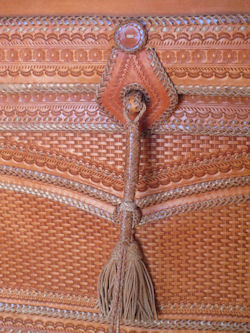
The blazing sun of southern Baja California fills every crevice, there is no shade. The road is carved out from the dirt and dry rock. I am not prepared for what is about to occur. Jane Ames, my traveling companion and guide, has created the opportunity to meet the vaqueros of the mountains of San Francisco, who are known for their very fine handcrafted leather work. We pull up to the not yet complete workshop in the hills south of San Ignacio. The Arces, father and son, have ridden a full day by horseback from Rancho San Gregorio through the remote and rugged mountains to be here. They greet us with quiet dignity and are smartly dressed as if going to a fiesta; the respect does not go unnoticed. Don Francisco the elder, quiet and reserved, allowed his son, Juan Gabriel, to present the new studio. We step inside and I breathe in the rich scent of new leather. Suddenly, I am stunned silent. I can not express what is happening, but it is as if the whole of these people's historic past has hit me all at once.
I first saw Juan Gabriel's work while visiting a Mulege street fair. Living Roots, a non profit organization had set up a booth. Their mission statement was one of protecting the historically significant people, their culture and their way of life, while at the same time, keeping them "vibrant as they transition into the modern world." Living Roots was featuring Juan Gabriel's work. I spotted the exquisite hand tooled saddle from several booths away. I had a similar experience then as I do now stopped in my tracks in silent awe. The saddle was to be auctioned and was traveling through many different towns. It was a work of pure and perfect intention.
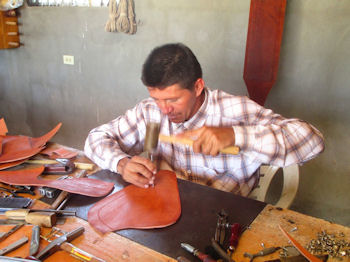
As luck would have it, this was the reason I now found myself here meeting Juan Gabriel and honored by his father's attendance. Don Francisco, with a twinkle in his eye, told of how his father had taught him and before that his grandfather. Arce is a name going back many generation with the first "Soldardos de Cuera" or Leather Jacket Soldiers. They came along with the Jesuit missionaries from Spain, although they were more frontiersmen than soldiers. Many stayed and married the Indian women of the region. The whole story, is a fascinating one and found on DVD or a short version on YouTube, Corazón Vaquero, The Heart of the Cowboy. Don Francisco is seen working the cow hide in this film and chronicles the life of a people in the 21st century still living as one with their environment.
As a boy on the rancho, Juan Gabriel took his father's instruction, but admits he now has developed his own style. He is winning awards because of the beauty of his skillful tooling. At our request he took us on a virtual tour of how the saddle is created. His obviously proud wife, Carolina, beamed and brought out fresh orange juice for refreshment.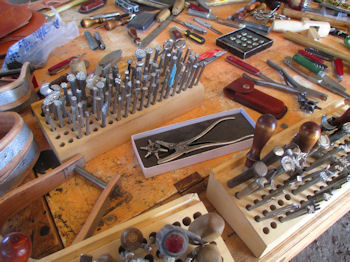 Naturally, the tour started with the cow. In the rancho's harsh environment, having no electricity and very little water, the meat from the steer must be dried. Every part of the animal is used. The hide goes through four long months in the tanning process before it is considered ready to work with.
Naturally, the tour started with the cow. In the rancho's harsh environment, having no electricity and very little water, the meat from the steer must be dried. Every part of the animal is used. The hide goes through four long months in the tanning process before it is considered ready to work with.
Today, as in the past, a wooden form of Cardón cactus slates begins the foundation and the hard wood of the mesquite tree is carved for both horn and the cantle, the raised part of the seat. It is then covered with wet rawhide and allowed to dry creating a strong smooth foundation. Juan Gabriel's well organized work table has hundreds of tools. Don Francisco chuckled and showed us the only tool he used as a young man. The knives are extremely sharp for cutting the graceful curves. Juan Gabriel demonstrated the steady hand and focused intention as he began to set the tooling design. In a rhythm that comes with years of practice, he hit the design tool with a whack, leaving its impression imbedded the leather. This was done until the entire piece was covered. Juan Gabriel has taken hand tooling from a craft to a true art form.
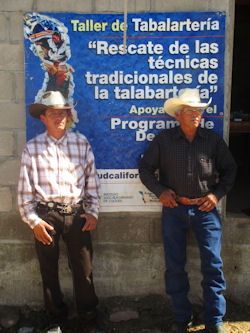
There were a few quiet whispers between husband and wife as they disappeared into another room. I thought I was filled to the brim with the experience, yet I had not seen the best of the best. With great ceremony, Juan Gabriel carried out a newly completed baul. I was seeing mastery and it was a thing of rare beauty. The fine tooling even continued on inside, covering every square inch of the interior. The leather shown with a radiance impossible to describe, it may have come from the generations of families working together to carve out a life from the heart of the mountains. After nearly three months of steady work, it all came to fruition in Juan Gabriel baul, perfect and flawless.
Juan Gabriel is a newly licensed teacher of leather work. The Mexican government is committed to supporting vaqueros' way of life. He accepts orders for custom work; the shoes he makes are beautiful and the lovely baul is for sale. He maintains his studio and new home with his wife near San Ignacio. But the rancho is still home and he often rides into the mountains to join Don Francisco. You can take the cowboy out of the mountains, but you can't take the mountains out of his heart.
Contacts:
Jane Ames for information about how to see Juan Gabriel for custom work: janebames(at)prodigy.net.mx
Living Roots: check out opportunities for youth leadership employment, traditional skills training and volunteer opportunities
Official website for Corazón Vaquero: The Heart of the Cowboy
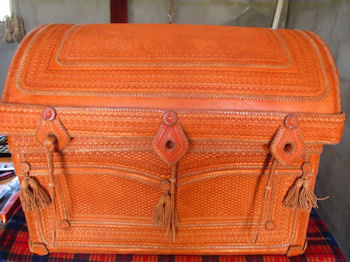
Martina's email: mteomaya(at)gmail.com

Getting my insurance online was easy. I’ll use them again.

(Translated by Google) I like the insurance because you can buy it for one day and it insures you...

It was really easy and informative.